
Middle Eastern, South Asian and Muslim passengers say they are increasingly victims of racial profiling and are being detained and harassed at airports. We speak with an American mother and daughter, both born in Iraq, who were held and questioned for hours at JFK airport. [includes rush transcript]
Twelve airline passengers arrested in Amsterdam on suspicion of planning acts of terrorism were released Thursday after Dutch police found no evidence they were about to commit an act of violence.
The men were onboard a Northwest Airlines flight to India when the crew became alarmed after they began using their cell phones soon after takeoff and ignored orders to stay in their seats. The pilot turned the flight around and made an emergency landing in Amsterdam to force the passengers off.
The twelve men did have one thing in common: All of them were Indian citizens or of Indian descent. The story is just the latest in what appears to be a sharp increase in racial profiling of South Asian, Middle Eastern and Muslim passengers over the past few weeks.
In just a nine-day stretch this month, a total of five Arab-American men and a Pakistani woman were tagged as potential terrorists. All of them turned out to be innocent.
At least one Congressmember has publicly called for screening people on the basis of race and religion. Last week, House Homeland Security Chairman Peter King endorsed requiring people of “Middle Eastern and South Asian” descent to ber singled out for additional security checks.
While the Justice Department and Homeland Security say they do not practice racial profiling, more and more cases are popping up around the country that tell a different tale.
Last week a group of Muslim-Americans say they were detained for hours at New York’s Kennedy Airport when they came back to the United States from trips abroad. Two of those people join us in our firehouse studio today. Nagham Al-Yaqoubi is a US citizen who was born in Iraq and lives in New Jersey. Her daughter Arwa Ibrahim is a student at Rutgers University. We are also joined on the line by attorney Omar Mohammedi, he is representing Nagham Al-Yaqoubi and her family and is president of the New York chapter of the Council on American-Islamic Relations.
- Nagham Al-Yaqoubi, U.S. citizen who was born in Iraq and lives in New Jersey.
- Arwa Ibrahim, Nagham Al-Yaqoubi’s daughter. She is a student at Rutgers University.
- Omar Mohammedi, attorney for Nagham Al-Yaqoubi and her family. He is president of the New York chapter of the Council on American-Islamic Relations and a representative for the Association of Muslim American lawyers.
Transcript
AMY GOODMAN: Last week, a group of Muslim Americans say they were detained for hours at New York’s Kennedy Airport when they came back to the United States from trips abroad. Two of them join us in our Firehouse studio today. Nagham Al-Yaqoubi is a U.S. citizen who was born in Iraq and lives in New Jersey. Her daughter Arwa Ibrahim is a student at Rutgers University. We welcome you both to Democracy Now!
ARWA IBRAHIM: Thank you.
NAGHAM AL-YAQOUBI: Thank you.
AMY GOODMAN: What happened?
ARWA IBRAHIM: Well, we were arriving on Tuesday, August 15, at 4:30 p.m. from a flight from Dubai, but it was actually a transfer flight from Jordan, where we had spent our vacation. And after we went through customs and the man looked at our passports, we were told to step aside for additional questioning, rather than claiming our baggage. We arrived in a small blocked-off area, and we looked around and we saw 200 other Arabs, South Asians and Muslims with us. We were told to pass up our passports and wait until we were called for questioning. We were held there for around five hours, and then we were questioned, and afterwards our bags were searched.
JUAN GONZALEZ: What kind of questions were they asking you?
ARWA IBRAHIM: They asked us, I felt, very inappropriate questions that they seemed to be recording into their computer. I don’t know for what purpose. They asked us about specifics of where we worked, what school I went to, what I majored in. And they also asked us about some of our political views. They asked my sister whether she felt that Iraq was better now or under Saddam’s rule, and they were recording everything they asked us.
AMY GOODMAN: How old is your sister?
ARWA IBRAHIM: My sister’s 22.
AMY GOODMAN: What did she say?
ARWA IBRAHIM: She said, “I don’t remember Iraq then.” But I think this question is so ridiculous, because — just because you’re for the war or against the war — if you’re against the war, it doesn’t mean that you’re suspicious or a terrorist of any kind. And they were recording everything, so to me it seems like maybe they were starting some sort of database. To me, it just made me feel uncomfortable.
AMY GOODMAN: How many of you were there?
ARWA IBRAHIM: There were 200 people, plus, when we were there.
AMY GOODMAN: How big is your family?
ARWA IBRAHIM: Our family is five people.
AMY GOODMAN: And they were you, your sister, your mother.
ARWA IBRAHIM: My other sister and my brother were also there. And when they were holding us there for the five hours, the Homeland Security officers were very rude. They threatened to arrest my mother. They also threatened to hold us longer if we complained. They didn’t provide us with enough seating. They didn’t provide us with food or water. And whenever we asked if we could have these things, if they could be given to us, they said that it’s not the government’s job to provide them for us.
JUAN GONZALEZ: Now, they threatened to arrest you? For what?
NAGHAM AL-YAQOUBI: I was just asking the officer to speak nicely to the people instead of yelling at them. And he said, “Well, I’ll arrest you, if you don’t be quiet.”
AMY GOODMAN: Did they question you?
NAGHAM AL-YAQOUBI: Yes. Job question, about like where do I work and how long have you been there. And also they asked us if we have any weapon training. Do we fencing?
AMY GOODMAN: Fencing?
NAGHAM AL-YAQOUBI: Fencing.
ARWA IBRAHIM: They said, do we fence or hunt, because that counts as weapons training.
AMY GOODMAN: Do you fence?
NAGHAM AL-YAQOUBI: No. No, I don’t. And none of my children do.
JUAN GONZALEZ: And the passengers there were from all the various flights that were coming in?
ARWA IBRAHIM: Yes, they were. JFK is saying that they’re not racially profiling, that what they’re doing is they’re just asking further questions of people that are coming from the Middle East. But actually that’s not true, because we had many white passengers on our flight from Dubai that were not further questioned, that were allowed to claim their baggage. So it was very obvious that it was racial profiling.
AMY GOODMAN: Did they ask you all together in the group of your sisters, brother, your mom?
NAGHAM AL-YAQOUBI: Well, two groups. First, the three of us: me, my son and my daughter — my older daughter. And then, they asked — we left, and they asked Sumia and Arwa. And specifically, she asked me to leave. I really wanted to stay with my other daughters, but she specifically asked me to leave.
JUAN GONZALEZ: I would think that if it were the other two children — were either of them minors at all?
NAGHAM AL-YAQOUBI: No, no. Like, the youngest we have is 20, so —
JUAN GONZALEZ: And has anything like this happened in the past, when you’ve traveled?
NAGHAM AL-YAQOUBI: Never. Never.
ARWA IBRAHIM: No. That’s never happened before.
NAGHAM AL-YAQOUBI: We were very surprised really.
AMY GOODMAN: We also called Homeland Security’s Custom and Border Protection and invited them on the program. They declined to join us, but we got this email from public affairs officer, Eric Blum. Let me just read a portion. “U.S. Customs and Border Protection does not use racial profiling. However, CBP officers may scrutinize more closely individuals from high-risk countries. CBP denies entry to thousands of individuals every year on grounds of inadmissibility, some of which include improper travel documents, prohibited activities or intent, traveling under the Visa Waiver Program without qualifying for participation in that program, smuggling of contraband or prohibited goods, criminal activity or history, immigration violations such as prior visa overstay, attempting to gain entry with fraudulent documents or posing as an imposter, watch list match or national security concerns, among others.” It goes on for a while, and it says, ”CBP does not comment on individual cases, as this information is protected under the Privacy Act.” After six hours, what did they say to you?
ARWA IBRAHIM: Nothing. We were just walked out the door. No explanations.
NAGHAM AL-YAQOUBI: Well, first, they asked us to go to another line. We were supposed to leave — look at our passport and leave. But then, when he looked at our passport again, he said, “Well, go to the other line.” And there, they asked us to open our luggage, and they want to search it. He left us for about 15 minutes. Then, he came back. Then, he started to search our luggage.
JUAN GONZALEZ: And there was never any apology for the delay, or for the five-hour delay that you had there?
NAGHAM AL-YAQOUBI: Not at all.
ARWA IBRAHIM: No apology. No explanation.
AMY GOODMAN: We’re also joined on the phone by Omar Mohammedi. He is representing Nagham Al-Yaqoubi and her family and is president of the New York chapter of the Council on American-Islamic Relations. We welcome you to Democracy Now!, Omar Mohammedi.
OMAR MOHAMMEDI: Thank you for having me on.
AMY GOODMAN: It’s good to have you with us. How common is this?
OMAR MOHAMMEDI: I would say this is common, actually. The difference between now, since August 15, and before August 15 — before August 15, the authorities were relying on the no-fly list. A no-fly list will list all the potential terrorists that are coming to this country. However, the problem is that no-fly list lists people with the name of common names, like Mohammed, and there are millions of Muslims called Mohammed, so they would be stopped, and they would be detained for six hours, questioned. And it was happening to mostly young men. It was not happening to families like you have in front of you.
However, after August 15, it’s becoming a trend that all families — it doesn’t matter who you are. Even if you are a family with children, you will be stopped, just because who you are, because you are Muslim, you’re South Asian, or you’re an Arab. And that is becoming now a trend and a practice, a common practice, that people of that origin are being stopped and being — to my knowledge, as an attorney, when you’re stopped for six hours and you’re not allowed to leave, you’re arrested.
JUAN GONZALEZ: Could you talk also about the incident that occurred on August 17th at Tri-State Airport in West Virginia?
OMAR MOHAMMEDI: That one, actually, I would rather not comment on it, but I do know there was an incident. There are many incidents, not only that one. But I would rather not comment on this one, because I don’t have all the necessary information for me to comment on that.
JUAN GONZALEZ: And in your organization, what are you attempting to do, given these increased number of incidents, now to able to assure some kind of decent treatment of Muslim and Arab passengers?
OMAR MOHAMMEDI: What we’re doing, actually, we’re gathering data now and trying to get as many information as we can. And then we will have to deal with it, just as we dealt with it at some point when the DOJ was investigating Stop-and-Frisk in New York City, NYPD, where they stopped many African Americans based on their race, and that’s something that we are contemplating, and we will be very — we will do something about that once we gather all the data and find out what happened.
AMY GOODMAN: We’re looking at case after case. One this week, a British Muslim airline pilot describing the humiliating moment when he was hauled off a transatlantic flight just before takeoff. His name is Amar Ashraf, born in North Wales, said he felt demoralized and humiliated after being told to leave the flight from Manchester to Newark by a stewardess and then being questioned by armed police. He believes his removal was down to having a Muslim-sounding name. Omar Mohammedi, what can people do? What can passengers do?
OMAR MOHAMMEDI: I will send this message to everyone, every person who has been stopped, has been treated this way, to make sure that they document that and to make sure they will inform civil rights organizations and let them know. That’s the only way we will be able to find out how many people like that have been detained, have been questioned, have been humiliated. And you have the Council on American-Islamic Relations, is one of them. You can call them, and there is New York, (212) 870-2002.
AMY GOODMAN: Finally, on the issue of the New York congress member, Peter King, saying that racial profiling is appropriate, your response?
OMAR MOHAMMEDI: You know, I think Peter King’s comment does not surprise me. Two years ago, he mentioned that 80% of people who go to mosque, they are extremists and they have no loyalty to this country. So, I mean, his comment — I mean, he wrote a book, and his book was full of defamatory statements against members of the community, which does not surprise me that he will call for racial profiling, which is illegal. It’s violating the Equal Protection Clause. It doesn’t matter what the situation is.
The reason we are here — the reason that we are [inaudible] different communities in this country is to get together and trying to fight terrorism. That is not the way to do it. You don’t identify a certain group, and you say, “This people, they are potential terrorists, because they belong to a faith.” Seven million Muslims living in America, and they cannot target them just because they are Muslims. Racial profiling does not work.
Behavioral profiling, yes. If someone is suspicious, is acting suspicious, I think it’s very important that we follow that person. However, to go — and it does not work, because you are just putting ourself in a hole. We are alienating the community. Seven million in the community, we do not put trust in them. And I can tell you, the FBI, actually, Director Robert Mueller stated in 2004 a response to the comment that Peter King made that time. He said, and I quote, “I should mention that Muslim American, Iraqi American and Arab American communities in the United States have contributed a great deal of our success, and on behalf of the FBI, I would like to thank this community for their assistance, for their ongoing commitment to prevent acts of terrorism.”
JUAN GONZALEZ: And finally, both of you are American citizens. Your reaction afterwards and your feelings about how your government treated you in this situation?
ARWA IBRAHIM: I felt very humiliated and saddened, because I was made to feel like an outsider in my own country. I’m a U.S. citizen. I consider myself American. I was going on vacation. That’s all I was doing. I don’t understand why I was made to feel like a criminal, like a terrorist. And it really does show you the direction that we’re heading in, and I think that’s why it’s so important to speak out against it.
NAGHAM AL-YAQOUBI: For me, I am really very sad. When I left — when we left Iraq, I wanted to give my children freedom, to come to the United States. But then, at that time, I realized that’s not happening. My children have to go through racial profiling and not feeling safe.
AMY GOODMAN: Well, I want to thank you both for being with us, Nagham Al-Yaqoubi, Arwa Ibrahim, a mother and daughter, for joining us. Omar Mohammedi, lawyer for the family, president of the New York chapter of the New York CAIR, Council on American-Islamic Relations.

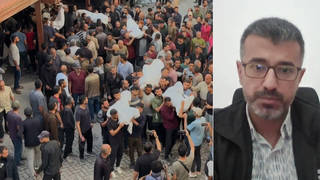
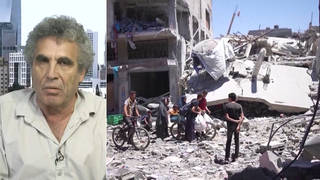
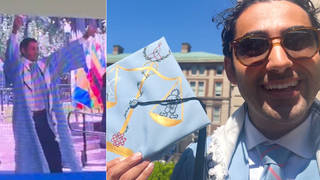

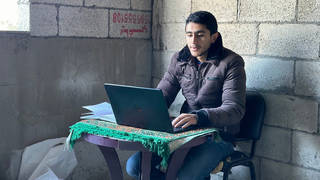




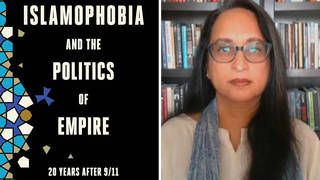

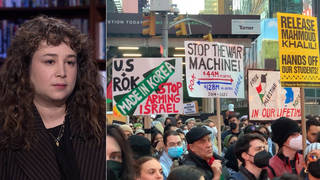
Media Options